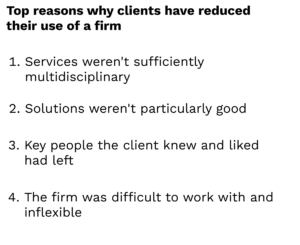Why will your clients leave you in 2025?
In an uncertain market, no professional services firm can afford to take its market share for granted. Clients’ needs are shifting, and firms must ensure they understand how—and use that intelligence to adapt what they offer. Otherwise, they risk losing work to better-informed competitors.
So, which clients are a flight risk this year?
The good news for firms is that client relationships look stickier in Q2 2025 than when we last looked at loyalty metrics back in Q1 2024. Back then, 60% of clients were looking to use new firms or a mix of new and familiar faces. Why? They told us they wanted the innovation and access to technology that this conferred.
Fast forward to 2025 and things have changed: In the latest iteration of Source’s regular survey of buyers of consulting, conducted in Q2 2025, only 1% of clients say they’d prefer to use new firms, and another 31% anticipate employing a mix of new and existing providers. So, at a time when little is predictable—think tariffs, regulation, costs, and conflicts—68% of business leaders crave the stability of working with firms that they know and trust.
Today, clients want to work with firms they know and trust
So, can you stop reading now? Are your current clients guaranteed to stick?
Unfortunately not. While clients value the peace of mind that comes with using a tried and tested provider, they will up and leave if they aren’t getting what they want.
Client loyalty cannot be taken for granted
Why do clients leave? Three of the top four reasons are ones that we hear time after time. Often, it’s when firms have disappointed them: Poor solutions and being difficult to work with are the second and fourth reasons, respectively. Third on the list is that key contacts have left—and at a time when splinter firms and new challengers with old faces are hitting the headlines, this is a real and present danger for incumbents.
But top of the list of reasons why clients say they’ve reduced their use of a firm is that the services offered weren’t sufficiently multidisciplinary. Clients are demanding solutions that cross functions, bridge silos, and solve multi-dimensional business problems. They continue to value expertise, but it needs to be applied widely.

How to win new work
While firms that are delivering high-quality, multidisciplinary services in an appealing and flexible way are likely to benefit from customer loyalty in today’s market, what about firms that are looking for new business?
That rare 1% of clients who say they prefer to use new firms isn’t an encouraging stat. But they are in fact using and considering new partners: Seventy-two percent said they have recently started to work with a firm that they hadn’t used much before. While businesses like to work with advisors they know, new providers remain part of the mix. What’s clear is that business leaders are less likely to be reaching out to potential new partners themselves. That means firms with a proactive approach to sales will be at a distinct advantage: The joint-top reason why clients this quarter say they considered using a new firm that they later bought from was that the firm approached them directly with interesting ideas for their business.
And what sealed the deal? This takes us nicely around in a virtuous circle. The top reason that a client started using a new firm that they hadn’t worked with much before was that the services on offer were multidisciplinary and so better met their needs.
Both incumbent and new firms that want to win work in today’s unreliable market need to ask themselves the following questions: Are we easy to work with? Are the solutions we provide good enough? And finally, what does great multidisciplinary working look like, and how can we deliver that? Incidentally, these are just the type of questions we love answering here at Source, so if you want an independent opinion on how you are doing, do reach out.
What can firms do next?
If you’d like to understand how you are perceived by existing, potential, and past clients then Source can help. Our bespoke client experience studies draw on objective feedback direct from the people that buy your services—considering the entire buyer journey from pitch to service delivery. Contact us for more information.


